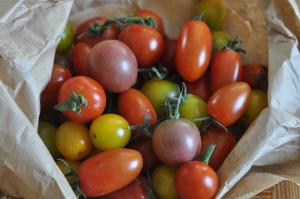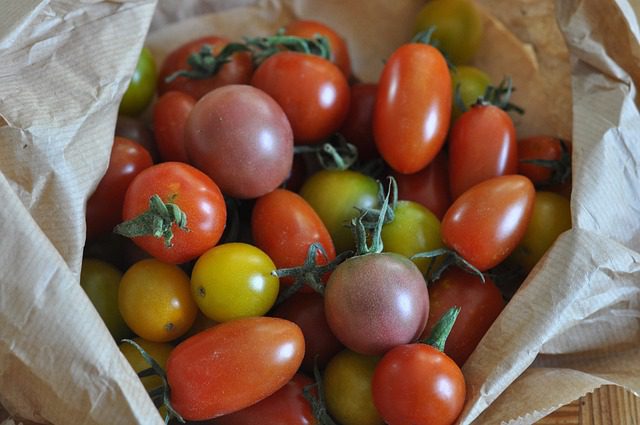
I picked a bag of tomatoes for a friend.
I bring in more tomatoes than I can handle. My stomach can finally digest vegetables again after two months of illness, so I eat a tomato a day. Adrienne likes homemade marinara sauce, but even she can eat too much of it. Michael is allergic to tomatoes; the juice gives him a rash. But the tomatoes don’t stop coming. I keep sharing them with the neighbors. Jimmy’s son picks a handful when he comes to visit. I left a bag of tomatoes and a vase of sunflowers on the porch of the man who brought water for his wife to discover in the evening, as a thank you for letting us use the hose whenever we need it in this drought. Next, I brought some to Ms. B, who lives on the next block.
You may remember Mrs. B. She is the mother of Ezra, the autistic boy who used to live across the street. Mrs. B was the nemesis of our stalking neighbors before she fixated on us – she would open the door to a cop or a confused social worker quite often before bad wiring in their shanty town house caused a disaster. They were homeless for a while and then moved into the house near the market. The market only has these tasteless tomatoes that they pick when they’re still green so they can survive the trip across the country. They’re barely edible, so when she mentioned that ripe tomatoes were her favorite, I ran into the garden.
The sun was shining, comfortably warm, which meant the tomatoes were comfortably warm. Each one felt alive, like a magical touchstone in my hand. I picked several Roma tomatoes, which taste only of tomatoes. They are the most productive tomatoes and the very best for cooking. I picked a beefsteak, which is sweeter than a Roma tomato. Beefsteaks are best for slicing and putting on a sandwich or between pieces of cheese. I picked a Mister Stripey the size of a beefsteak, which is sweet as a pineapple, sweet enough for dessert. It would be sacrilege to do anything with a Mister Stripey other than eat it like an apple, straight from the garden. And I picked a tiny red cherry tomato from a vine that happened to grow out of the compost. I think it came from some rotting lettuce I found in a produce bin.
I once read an Eastern European folk tale about a witch who lived in a swamp and tricked men into drowning themselves by giving them pots of gold and jewels. My sack of tomatoes reminded me of the illustration in that text: a supply of incredibly bright rubies of various sizes. These tomatoes were better than the very best rubies. Rubies are not edible when they are still warm from the garden on a summer afternoon.
On the way to Mrs. B’s house, I thought of the story. You’ve probably heard a similar fairy tale before. You could probably tell me how to get a handful of treasures without falling into the witch’s trap.
To avoid the witch’s trap, people insisted that they were not allowed to take any treasure from her pot of gold. They were only allowed to take the treasure that she gave them with her own hands, even if that treasure did not look particularly tempting.
I pretended to be the Swamp Witch all the way to Mrs. B’s house. When I got there, my bag of rubies was still warm.
“Is your mother here?” I asked Ezra, who is now almost grown but still likes to eat dry cereal from a bowl on the porch while he watches the cars drive by. He left his cereal bowl on the porch when he went to get his mother. The first to come out the door was the second youngest, who was a toddler when I met her but is starting fifth grade this year. Finally, Mrs. B herself arrived with the baby. The baby was born only six months ago, an impossibility; Mrs. B is a year older than me and had been told she would never have more children.
The baby was a baby of the very best kind: happy, healthy, heavy as a sandbag and plump like my tomatoes.
She had thin blonde hair on her neck, but a small bald patch on the roundest part of her head. I was allowed to snuggle her with the patch against my cheek while we chatted about what a surprise she had been. Mrs. B’s eldest, who is in her twenties and lives with her, had come to the hospital to help with the birth. The birth was certainly not easy at her age. Now the eldest said that if she ever wanted a baby, she would just adopt. But she loved the baby. Sometimes Mrs. B would wake up to find the eldest had fallen asleep and was rocking the baby as if she were the baby’s second mother.
“It doesn’t take away the pain of her father being gone,” she said, referring to her own father, who died before Christmas. “But it’s, well, you know…”
“Is this some kind of distraction?” I asked voluntarily.
“Yes!” said Mrs. B. “Yes. A good distraction from all this. But poor Ezra is outnumbered. Now he’s the only boy in the house.”
Next we talked about Ezra and how well he was doing and what he was learning in school. How well the second oldest was doing and what chapter books she had finished reading over the summer. How good the oldest was at her job and how much better she would feel if she went to the doctor for her back pain.
“You know how the babies come out,” said Mrs. B, smiling at each child one by one. “You don’t know how they get in yet.”
I laughed.
I went home feeling like life had been good.
Some time later, I went to water the garden again with the neighbor’s garden hose. The goldfinch and the cardinal were just eating my sunflower seeds. They scurried away, full of color and majesty, as if they too were truly an enchanted treasure.
Jimmy’s son was in the garden with his friends while I was gone. He now stores his sand tools in Adrienne’s old sandbox so he has something to keep him entertained whether I’m there to show the garden or not.
There was a time when I thought I would never, ever, ever get along with the people of Appalachia. I just wanted to go home to the Midwest.
There was a time when I would have drowned myself in any swamp, grasping at these treasures rather than those that were handed to me.
I realized that despite all my problems, I felt completely happy.
I think I’m home.
Mary Pezzulo is the author of Meditations on the Way of the Cross, The worries andd Joys of MaryAnd Stumbling into Grace: How We Encounter God Through Small Works of Mercy.

